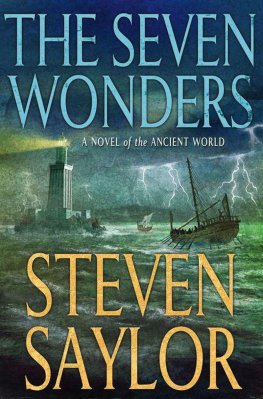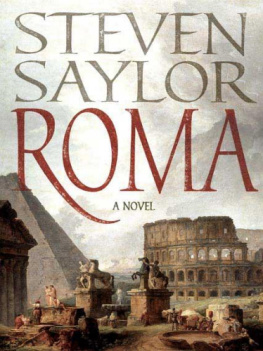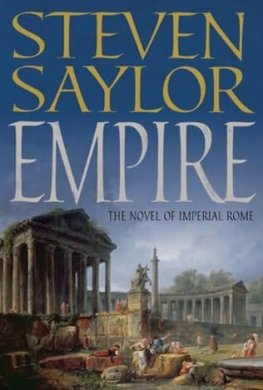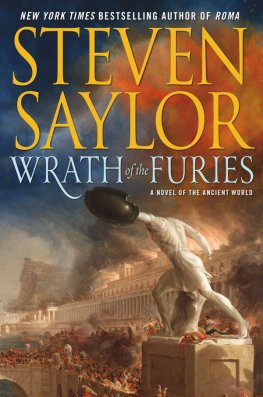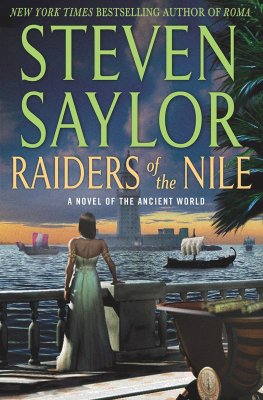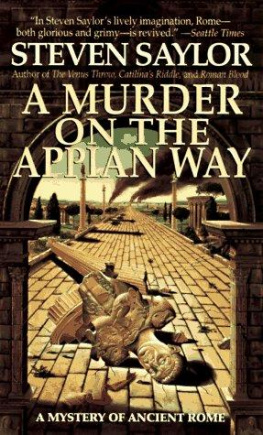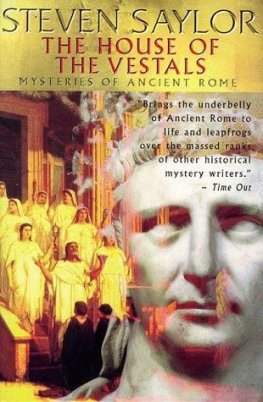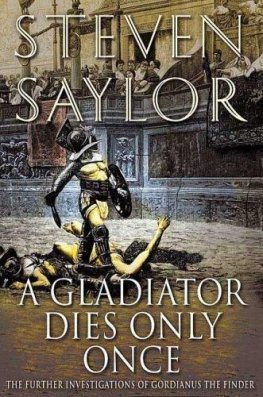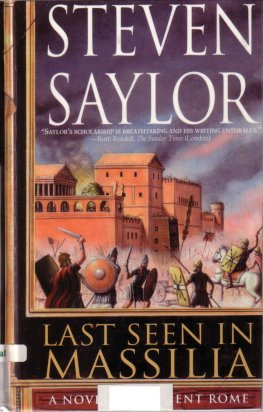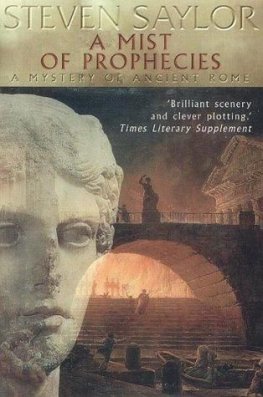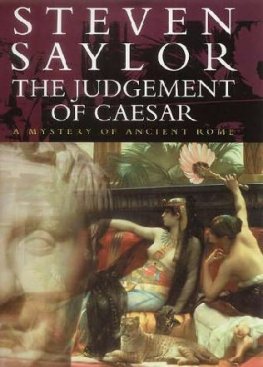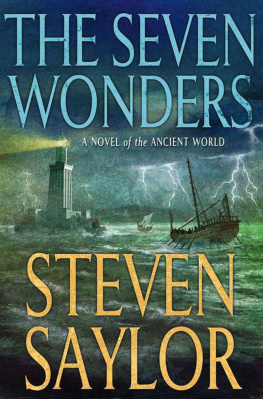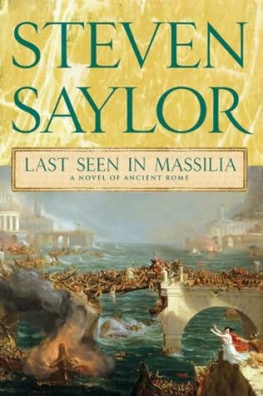Steven Saylor - The Seven Wonders
Here you can read online Steven Saylor - The Seven Wonders full text of the book (entire story) in english for free. Download pdf and epub, get meaning, cover and reviews about this ebook. year: 2012, publisher: Macmillan, genre: Detective and thriller. Description of the work, (preface) as well as reviews are available. Best literature library LitArk.com created for fans of good reading and offers a wide selection of genres:
Romance novel
Science fiction
Adventure
Detective
Science
History
Home and family
Prose
Art
Politics
Computer
Non-fiction
Religion
Business
Children
Humor
Choose a favorite category and find really read worthwhile books. Enjoy immersion in the world of imagination, feel the emotions of the characters or learn something new for yourself, make an fascinating discovery.
- Book:The Seven Wonders
- Author:
- Publisher:Macmillan
- Genre:
- Year:2012
- Rating:5 / 5
- Favourites:Add to favourites
- Your mark:
- 100
- 1
- 2
- 3
- 4
- 5
The Seven Wonders: summary, description and annotation
We offer to read an annotation, description, summary or preface (depends on what the author of the book "The Seven Wonders" wrote himself). If you haven't found the necessary information about the book — write in the comments, we will try to find it.
The Seven Wonders — read online for free the complete book (whole text) full work
Below is the text of the book, divided by pages. System saving the place of the last page read, allows you to conveniently read the book "The Seven Wonders" online for free, without having to search again every time where you left off. Put a bookmark, and you can go to the page where you finished reading at any time.
Font size:
Interval:
Bookmark:
Steven Saylor
The Seven Wonders
With a favorable wind, Apollonius and his disciple Damis arrived in Rhodes. As they approached the Colossus, Damis exclaimed, Teacher, could anything be greater than that? To which Apollonius replied, Yes, a man who loves wisdom in a sound and innocent spirit.
-PHILOSTRATUS, THE LIFE OF APOLLONIUS OF TYANA , 5:21I
Now that youre dead, Antipater, what do you plan to do with yourself?
My father laughed at his own joke. He knew perfectly well what Antipater was planning to do, but he couldnt resist a paradoxical turn of phrase. Puzzles were my fathers passion-and solving them his profession. He called himself Finder, because men hired him to find the truth.
Not surprisingly, old Antipater answered with a poem made up on the spot; for yes, the Antipater of whom I speak was the Antipater of Sidon-one of the most celebrated poets in the world, famed not only for the elegance of his verses but for the almost magical way he could produce them impromptu, as if drawn from the aether. His poem was in Greek, of course:
I died on my birthday, so I must leave Rome.
Now your son has his birthday-is it time to leave home?
Antipaters question, like my fathers, was merely rhetorical. For days the old poet and I had been making preparations to leave Rome together on this day. He gave me a smile. It does seem unfair, my boy, that your birthday should be overshadowed by my funeral.
I resisted the urge to correct him. Despite his lingering habit of addressing me as a boy, I was in fact a man, and had been so for exactly a year, since I put on my manly toga when I turned seventeen. What better way to celebrate my birthday, Teacher, than to set out on a journey such as most people can only dream of?
Well put! Antipater squeezed my shoulder. Its not every young man who can look forward to seeing with his own eyes the greatest monuments ever built by mankind, and in the company of mankinds greatest poet. Antipater had never been modest. Now that he was dead, I suppose he had no reason to be.
And its not every man who has the privilege of gazing upon his own funeral stele, my father said, indicating with a wave of his hand the object of which he spoke.
The three of us stood in the garden of my fathers house on the Esquiline Hill. The sky was cloudless and the air was warm for the month of Martius. In front of us-delivered only moments before from the sculptors workshop-stood a riddle in marble. It was a funeral stele for a man who was not dead. The rectangular tablet was elegantly carved and brightly painted, and only about a foot tall. Later it would be placed atop the sepulcher intended for the dead mans ashes, but for now it was propped atop the crate in which it had been delivered.
Antipater nodded thoughtfully. And not every man has the opportunity to design his own monument, as I have. You dont think its too irreverent, do you, Finder? I mean, we dont want anyone to look at this stele and realize its a hoax. If anyone should surmise that Ive faked my own death-
Stop worrying, old friend. Everything is going as we planned. Five days ago I entered your death in the register at the Temple of Libitina. Thanks to the rich matrons who send a slave to check the lists several times a day, word of your demise spread across Rome in a matter of hours. People assumed that your old friend and patron Quintus Lutatius Catulus must be in possession of your remains and in charge of the funeral arrangements. There was disbelief when it was discovered that a citizen as humble as myself had been named executor in your will, and that your remains were to be displayed in the vestibule of my house. But so it was. I summoned the undertakers to wash and perfume the body, purchased flowers, cypress sprigs, incense, and a very elegant bier-your will provided for all necessary expenses-and then I put your corpse on display in the vestibule. And what a turnout youve received! All the poets and half the politicians in Rome have come to pay their respects.
Antipater flashed a wry smile. My demise has allowed you to make the acquaintance of the best people in Rome, Finder-just the sort who are always getting dragged into court for murdering each other. I daresay this could prove a windfall for you-meeting so many potential new clients!
My father nodded. Everyone has come to have a look, it seems-except Catulus. Do you imagine your patron is sulking, because the will didnt name him as executor?
More likely hes been holding off, waiting until today to pay his respects-the day of the funeral-so that his visit will be as conspicuous as possible. Catulus may have the soul of a poet, but he has the instincts of a politician-
Antipater fell silent at the sound of a knock at the front door.
Another caller. I shall disappear at once. Antipater hurried to the concealed door that gave access to a narrow chamber next to the vestibule, where a tiny crack in the wall served as a peephole and allowed him to observe all that transpired.
A moment later, my fathers doorkeeper-the only slave he owned at that time-appeared in the garden.
You have a visitor, Master, Damon wheezed. The constant flood of callers was running the poor old fellow ragged. He cleared his throat and I saw him concentrate, determined to get the name right. Lintus Quitatius Catulus, former consul of the Republic, has come to pay his respects to the deceased.
Quintus Lutatius Catulus, I think you mean, said my father indulgently. Come, son, let us greet the consul.
The man in the vestibule was perhaps sixty years old. Like my father and me, he was dressed in a black toga, but his was embroidered with a purple band that marked his status as a senator. Ten years ago Catulus had served as consul and commander of the legions; it was his army that annihilated the Cimbri at the battle of the Raudine Plain. But Catulus was also a man of culture and learning, and was said to have a sensitive nature. He stood stiffly upright before the funeral bier with his hands crossed before him.
My father introduced himself, and me as well, but Catulus hardly seemed to notice. Your distinguished presence graces my home, Consul, though I regret the sadness of the occasion. Did you come alone?
Catulus raised an eyebrow. Of course not. I left my retinue outside, so that I could spend a moment alone with my old friend-face-to-face, so to speak. But alas, his face is covered. Catulus gestured to the mask, made of wax, which concealed the face of the corpse. Is it true that his features were damaged by the fall?
Im afraid so, said my father. The undertakers did what they could to make him presentable, but the damage was such that I decided it was preferable to conceal the injuries. Normally, a death mask is made from the direct impression of the face in repose. But in this case, I hired a sculptor to create the likeness. The mask will be used in the funeral procession, as usual, but until then Ive placed it over his face. I think the sculptor did a very good job, dont you? It really does look like Antipater, lying there with his eyes shut, as if he slept. Still, if you wish to gaze upon his face.
Catulus nodded grimly. Im a military man, Finder. Ive seen the most terrible things that can be done to human flesh. Show me.
My father stepped to the bier and lifted the death mask.
The staid consuls abrupt, girlish shriek, stifled by a fist to his mouth, was so incongruous that I almost laughed out loud. Behind the wall, I heard a noise like loose plaster falling, and imagined Antipater shaking with mirth.
Catulus glanced at the wall. My father shrugged and looked embarrassed, as if to apologize for the presence of rats.
But how could a mere fall have resulted in such terrible disfigurement? Catulus kept his fist pressed to his mouth. He looked a bit green.
Font size:
Interval:
Bookmark:
Similar books «The Seven Wonders»
Look at similar books to The Seven Wonders. We have selected literature similar in name and meaning in the hope of providing readers with more options to find new, interesting, not yet read works.
Discussion, reviews of the book The Seven Wonders and just readers' own opinions. Leave your comments, write what you think about the work, its meaning or the main characters. Specify what exactly you liked and what you didn't like, and why you think so.

